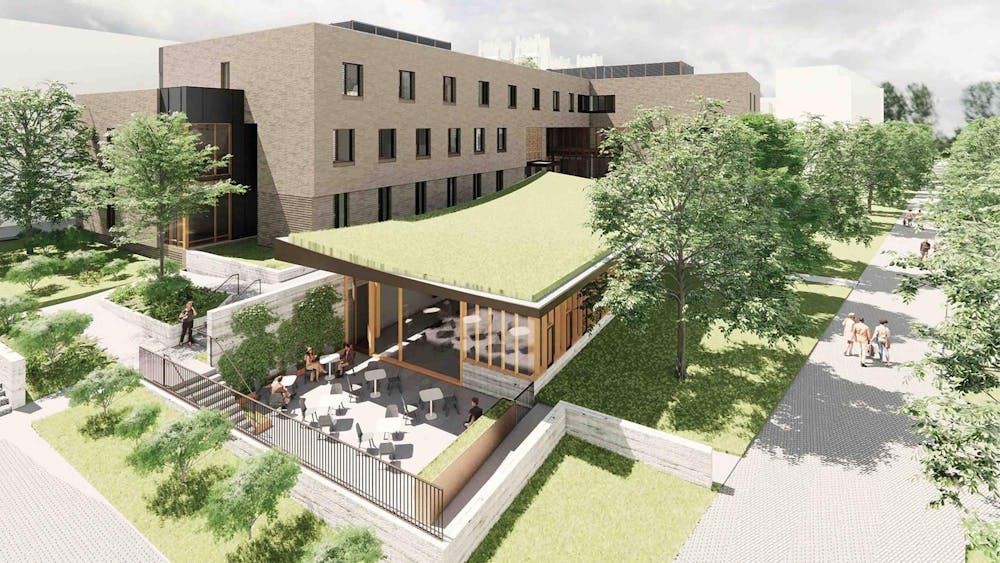In 1971, William "Bill" Frist ’74 had just $10 in his pocket when confronted by three chair-wielding assailants outside Princeton Inn College on a Sunday at 12:30 a.m. According to The Daily Princetonian, Frist, a brown belt in karate, successfully defended himself and sent two of the attackers sprawling. More than 50 years later, powered by several multi-million dollar gifts to his alma mater, Bill Frist and his family are creating a legacy and presence on campus matching some of the University’s biggest names.
The University announced a plan to replace McCosh Health Center last week, funded by a “major gift” from Dr. Thomas Frist Jr., a billionaire physician-businessman and brother to Bill Frist, a former senate majority leader. The new health center will bear Thomas Frist Jr.’s name. The new facility will be more than twice the current health center’s size, and is expected to open its doors in 2025. It will sit opposite Frist Campus Center, named after Bill Frist, one of the most heavily-trafficked buildings on campus.
While Thomas Frist Jr. is not a Princeton alumnus, the Frists claim three generations of Princetonians and rank among the University’s largest donor families. The recent gift comes alongside two other donations from the Frists to enhance student life and wellness at Princeton in the last 25 years. The Frists also claim close familial ties to Vanderbilt University, where Thomas Frist Jr. went to college, and contributed an “unprecedented gift” to help fund the construction of an $300 million athletics village in 2023.
The Frist family members that have attended Princeton include Thomas Frist Jr.’s sons, Thomas Frist III ’91 and William R. Frist ’93, and grandchildren Caroline Frist ’23 and Tommy Frist ’27. Jacqueline Frist, a third grandchild, started at Princeton in 2021 but transferred to Vanderbilt in 2022.
“Coming to Princeton was a life-changing experience for my brother Bill and various family members who have had wonderful experiences as students,” Thomas Frist Jr. told University communications.
The new health center will be a four-story complex, built from a renovated Eno Hall and a major expansion to the south. According to Princeton Alumni Weekly, it will be designed to be “healing in character,” including “serene spaces, adjustable lighting and temperatures, and ... a winter garden.” The increased size of the new center will help to accommodate the growing undergraduate student body, which the University plans to increase by 500 students over four years. It will house medical services, health promotion and prevention services, counseling and psychological services, and the sexual harassment/assault advising, resources, and education (SHARE) office.
These services are currently housed in McCosh Health Center. The current McCosh Health Center was named in honor of Isabella Guthrie McCosh, wife of President James McCosh. She has been described as serving as the unofficial Director of Campus Health Services during his presidency starting in 1868. As McCosh Hall, home of the English department, is named after President McCosh, the new health center, like the last, will share a name, but not a namesake with another prominent building on campus. McCosh Health Center has a prominent presence in Princeton pop culture, as a student taken to the center after a night of drinking would be termed “McCoshed.”
In an Undergraduate Student Government (USG) meeting this October, USG President Stephen Daniels ’24 suggested the location of the current McCosh Health Center might be used to revive a campus pub. This opens the possibility that a student drinking at McCosh may be “Fristed.”

The new health center will bolster the family’s legacy; however, the Frist name has signified “the absolute epicenter of campus” since 2000, when Frist Campus Center was completed. The family provided a $25 million donation to fund the student center. In a dedication speech, delivered on Oct. 20, 2000, former University President Harold T. Shapiro praised it as a “milestone in Princeton’s history.”
Dominating the center of campus, the Frist name will be associated with not only contributions to the University but also to the national scene as Bill Frist was leading political figure in the early 2000s.
Bill Frist's political career traces back to his University days. The first in his family to attend Princeton, he served as the vice president of his senior class and as a young alumni trustee from 1974–1978 and a university trustee from 1991–2001. He also gave the baccalaureate day speech in 1997.
Bill Frist returned to campus in 2003 to receive the Woodrow Wilson Award and the American Whig-Cliosophic Society's James Madison Award. As reported by The Daily Princetonian at the time, the Republican senator was met by 25 student protestors from from the Queer Radicals' Student Global AIDS Campaign (SGAC) and graduate student action group Another World is Possible, who objected to the senator's voting record on LGBTQ+ issues.

The changes in central campus are bound to have an effect on the community. “Our primary goal in making this gift is to make the Princeton family healthier in mind, body, and spirit,” Thomas Frist Jr. told University communications.
Rebecca Cunningham is an assistant News editor for the ‘Prince.’
Tess Weinreich is an associate News editor at the ‘Prince.’
Please send any corrections to corrections[at]dailyprincetonian.com.








